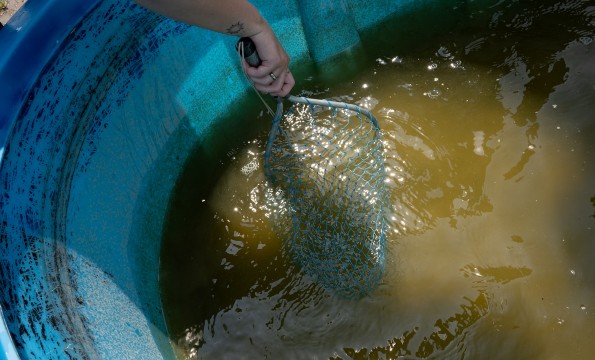For many of us, goldfish bring back memories of glass bowls and sprinklings of fish food. But what if that childhood pet turned out to be an ecological troublemaker?
Goldfish may seem harmless, but when released into the wild, they don’t just survive; they thrive. In freshwater across the world, goldfish are literally stirring up trouble. They are clouding waters, throwing natural systems off balance, and even outcompeting native species. What started as a small pet can become a big problem.
Investigating the impact at Gault
Emma Schubert, a PhD student at McGill and Gault Research Award recipient, is leading experiments to uncover just how these invaders reshape ecosystems. Emma uses large tanks called mesocosms, controlled, outdoor environments that simulate real pond ecosystems. These are part of the LEAP (Large Experimental Array of Ponds) a facility which gives scientists access to a very precious resource: water piped from nearby Lake Hertel. This water contains naturally occurring microorganisms like plankton, bacteria, and microalgae, replicating freshwater ecosystems better than plain tap water could.
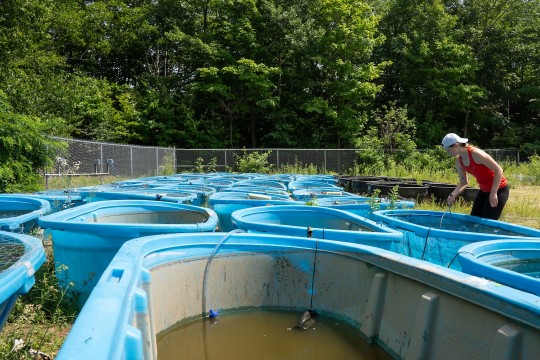
Emma’s mesocosm experiment at Gault (photo: Alex Tran)
The trouble with turbidity
A major focus of Emma’s research is turbidity: how cloudy or murky the water becomes when particles are stirred up. Goldfish feed by sucking and spitting sand, which clouds the water. Emma added sand to the bottom of her mesocosms and introduced goldfish caught in Burbank Pond in Danville, Quebec, a freshwater pond environment with a large and problematic invasive goldfish population.
She’s testing whether increasing the number of goldfish lead to more turbidity and even a rise in water temperature, as well as how algae growth is impacted.
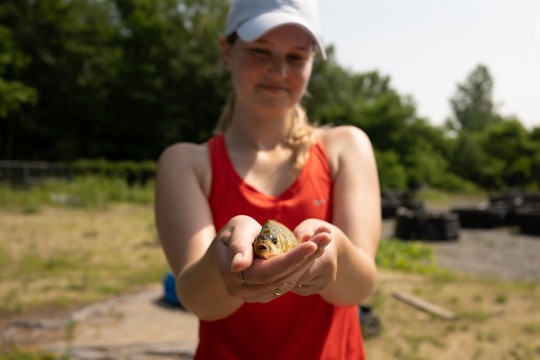
Emma Schubert is supervised by Anthony Ricciardi, professor at the Redpath Museum and director of the Bieler School of Environment (photo: Alex Tran)
Why does turbidity matter? Cloudy water blocks sunlight, stopping underwater plants and algae from photosynthesizing. This reduces oxygen levels and threatens entire aquatic communities. Fish, amphibians and insects all suffer. Goldfish also eat eggs, larvae, and vegetation, putting native species like newts at risk by reducing food sources and shelter.
From aquariums to the wild
Goldfish are native to China, but they’ve now spread to freshwater systems across the globe (except for Antarctica). Their spread is mostly due to pet owners releasing unwanted fish into local ponds or lakes. Goldfish reproduce quickly and acclimatize easily.
Over just a few generations in the wild, the bright orange colour of store-bought goldfish fades to a more natural brown, the perfect camouflage to avoid predators. That’s why you might not even realize they’re in your local waters.
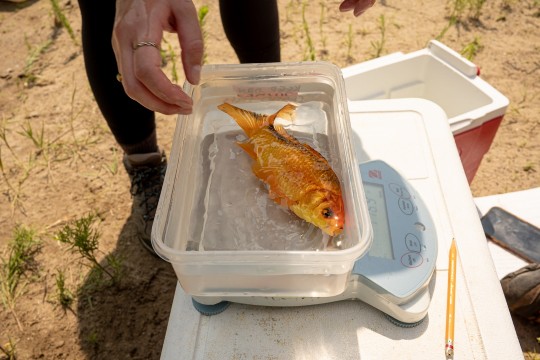
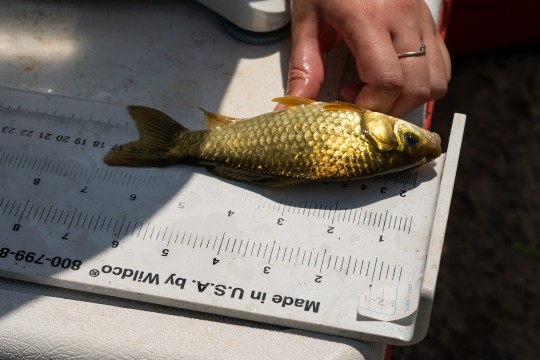
Natural colour variations found in released goldfish populations (photo: Alex Tran)
What you can do to help
Emma’s research sends a clear message: do not release pet fish into the wild. A single pet goldfish might seem insignificant, but over time, it can disrupt entire ecosystems.
If you can no longer care for your goldfish, there are safe alternatives:
- Find a new home with friends or family
- Contact a local aquarium or school
- Return it to the pet store
- Bring it to a local SPCA
By acting responsibly, we can help protect freshwater biodiversity and prevent further spread of invasive species.
About the researcher
Emma Schubert is a PhD candidate supervised by Anthony Ricciardi, professor at the Redpath Museum and director of McGill’s Bieler School of Environment. Her interest in invasive species research began while working on Lake Superior with the Ontario Ministry of Natural Resources in the Upper Great Lakes Management Unit, where she contributed to projects assessing the impact of invasive sea lamprey on lake trout. Outside of her research, Emma enjoys hiking and camping, and can also be found figure skating or crocheting.
A note on animal welfare in research
All animal research at McGill follows strict ethical guidelines and animal care protocols. A veterinarian oversees Emma’s experiments, and her project was reviewed and approved for humane treatment. No illness or abnormal behaviour was observed in any of the fish.
Corinne Lapierre
Field Operations Assistant in 2024 and 2025
Gault Nature Reserve
